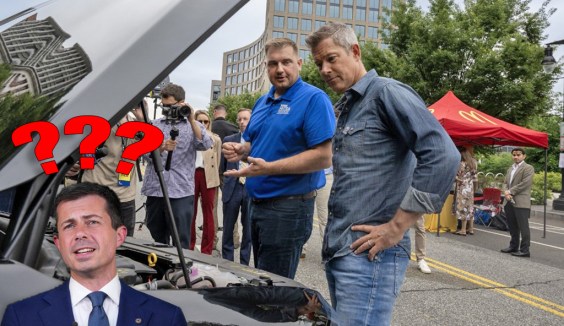A familiar script for Washington infrastructure watchers began to unfold last night on the Senate floor, as House-side resistance to a 10-month extension of existing federal transportation law prompted Democratic leaders to seek a quick deal on a one-month stopgap -- the fourth such short-term move in six months.
 Sen. Jim Bunning (R-KY) (Photo: CNN)
Sen. Jim Bunning (R-KY) (Photo: CNN)But one GOP senator, the notoriously irascible Jim Bunning (KY), objected to the 30-day extension, which also would ensure continued payment of federal unemployment benefits. When Democrats pleaded with Bunning to drop his one-man filibuster effort, Politico heard the retiring Kentuckian offer a terse response: "Tough s--t."
If an extension cannot be passed before the 2005 transportation law officially expires at midnight on Sunday, the result would be a quasi-shutdown of operations at U.S. DOT. A source at the agency told Streetsblog Capitol Hill that all employees of the Federal Highway Administration, save for its chief, would be sent home and states would stop getting reimbursed for their spending on all road projects.
The Federal Transit Administration would see a freeze of its own, the U.S. DOT source said, with contract authority to fund local projects sitting in limbo until Congress acts. Perhaps the most untimely delay would occur at the National Highway Traffic Safety Administration (NHTSA), where regulators are ramping up their oversight efforts after the Toyota recall debacle.
"[I]t is simply unfair for one senator
to attempt to hold the Senate hostage,” Dick Durbin (D-IL), the upper chamber's No. 2 leader, said last night in a statement.
Where does that leave Democrats? Working furiously to break through Bunning's roadblock, even as more House members join transportation committee chairman Jim Oberstar (D-MN) in raising objections to the Senate jobs bill that would keep existing federal programs intact until 2011.
Oberstar and about two dozen members of his panel take issue with the Senate jobs bill's treatment of $932 million in grants that would be spent this year as part of a 10-month extension of existing transport law. Giving that money to states using the template of 2009 earmarks -- as the Senate jobs bill proposes -- would direct the majority of the money to four states, leaving 22 states with nothing.
A letter sent earlier this week by 23 members of the transportation committee asks for the grant money to be given out on a "discretionary, competitive" basis. However, Oberstar spokesman Jim Berard said in an interview that the chairman has offered a compromise that would allocate the funding based on existing federal transportation formulas.
Berard said that Oberstar would prefer to see the $932 million allocated competitively to projects rather than distributed by formula. But he acknowledged the reasoning behind the Senate's argument that applying for the funding would not facilitate quick job creation. "If we're not going to make it competitive," Berard said, "at least let's make it equitable."
At the moment, the House appears unlikely to act on the jobs legislation until at least next week, giving Oberstar and his panel more time to reach agreement with senators -- and heightening the drama of Bunning's Senate floor show.
Late Update: Congress and state DOTs are now preparing in earnest for a federal transportation shutdown come Monday. Oberstar told reporters this afternoon that the "astonishing" Senate gridlock would result in the loss of $153 million in reimbursements for highway projects and $31 million in transit reimbursements during each day that Congress goes without extending the existing law.
The ramifications were felt as early as yesterday in Missouri, where officials canceled a scheduled bid for road and bridge projects of all types, anticipating a possible loss of funding from Washington. The U.S. Chamber of Commerce released a statement warning that "thousands of jobs are at risk" due to Bunning's ongoing objections. Meanwhile, House Speaker Nancy Pelosi (D-CA) told reporters this afternoon that she expects the House to take up the Senate jobs bill next week, though she did not hint at how Oberstar and his panel's criticism of the plan would be resolved.
Rob Puentes of the Brookings Institution, writing on The New Republic's blog, sounded an ominous note about the shutdown's effect on the long-stalled transportation debate:
Despite earnest and sustained callsfor a long term national commitment to infrastructure little progressis being made. Not to put too fine a point on it: but if Congress candismiss the program in place today and risk a shutdown, it does notbode well for comprehensive reform.





